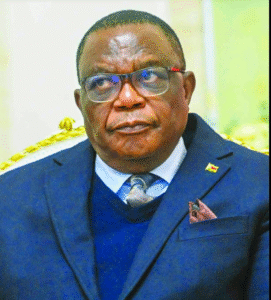CHIVAYO AND MNANGAGWA’S COSY TIES SPARK FRESH OUTCRY OVER CORRUPTION IN ZIMBABWE

Zimbabweans watched with anger and disbelief as President Emmerson Mnangagwa stood alongside businessman Wicknell Chivayo and visiting Kenyan President William Ruto yesterday. The meeting took place ahead of the Zimbabwe International Trade Fair in Bulawayo, but instead of showcasing the country’s economic strength, it laid bare the disturbing link between politics and personal business interests.
Wicknell Chivayo is no stranger to controversy. He is one of the most talked-about businessmen in Zimbabwe, not for innovation or economic vision, but for questionable government contracts and flashy spending. His company, Intratek, is tied to a US$200 million solar energy deal—yet there is little to show for it. Despite past court cases and public outrage, Chivayo continues to enjoy the protection and friendship of Mnangagwa’s government.
Many Zimbabweans are asking a simple question: what is Chivayo doing at high-level meetings with visiting presidents? He is not a government official. He is not a diplomat. He is a businessman with a history of shady dealings and unanswered questions. His presence sends a loud and clear message—corruption is not just ignored in Zimbabwe; it is celebrated.
Chivayo has become a symbol of elite privilege. Recently, he has been giving away cars to Zanu PF supporters and celebrities like it’s a wedding party. Meanwhile, millions of ordinary Zimbabweans cannot afford bread or bus fare. This vulgar display of wealth is happening while hospitals collapse, teachers go without pay, and pensioners starve. It is an insult to every citizen who works hard and plays by the rules.
Critics believe Chivayo’s fortune is not from business genius but from political connections. His open praise for Mnangagwa, paired with massive government deals, suggests a dirty alliance where loyalty is rewarded with contracts. This is the very definition of cronyism—when friends of the powerful become rich, and everyone else suffers.
The deeper danger is how this damages public trust. When businessmen like Chivayo become more powerful than ministers and are seen beside presidents, people lose faith in institutions. They start to believe that success in Zimbabwe depends not on merit, but on who you know. That is the death of democracy and the rise of a mafia-style system where loyalty replaces law.
This is not just a Zimbabwean problem. Across Africa, citizens are fighting similar battles—trying to separate power from profit, government from greed. When politicians bring businessmen into national events, especially those with a history of corruption, they send a message that the system is rigged. That message kills hope and fuels anger.
It is even more worrying when these private interests are put on display in front of international guests. What kind of image does this send to potential investors from Kenya or beyond? It tells them that in Zimbabwe, business success is tied to political favour. That’s not the image of a free and fair economy. It’s the image of a captured state.
Zimbabwe needs investment, not exploitation. It needs public servants, not power-hungry friends. It needs leaders who fight corruption, not those who invite it to the dinner table.
Chivayo’s rise and continued presence at state events is not harmless. It is dangerous. It undermines the fight against corruption and makes a mockery of the sacrifices made by millions of Zimbabweans every day. The president should be standing with the people, not with the rich men who feed off them.
Zimbabwe’s future must not be sold to the highest bidder. The country belongs to its citizens—not to Chivayo, not to Mnangagwa’s inner circle, and not to any foreign partner happy to ignore corruption in exchange for business.
The people of Zimbabwe deserve better. They deserve leaders who lead with integrity, not ones who hide behind flashy businessmen while the nation crumbles. They deserve a government that serves them, not one that protects thieves in designer suits.



